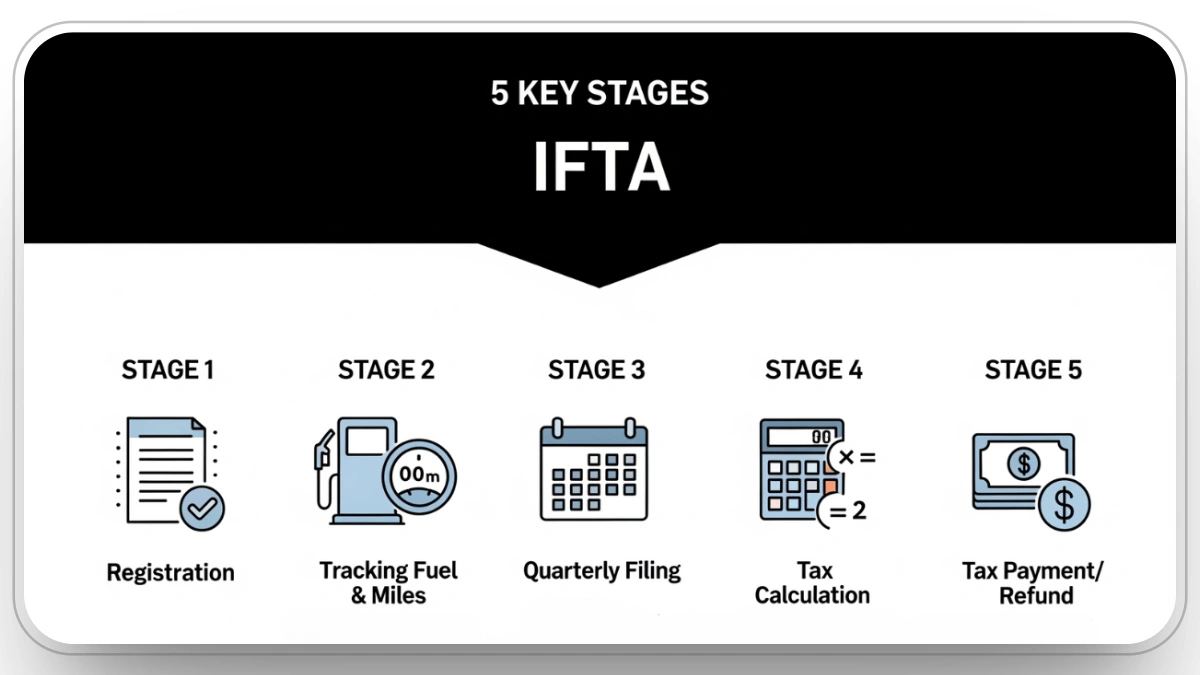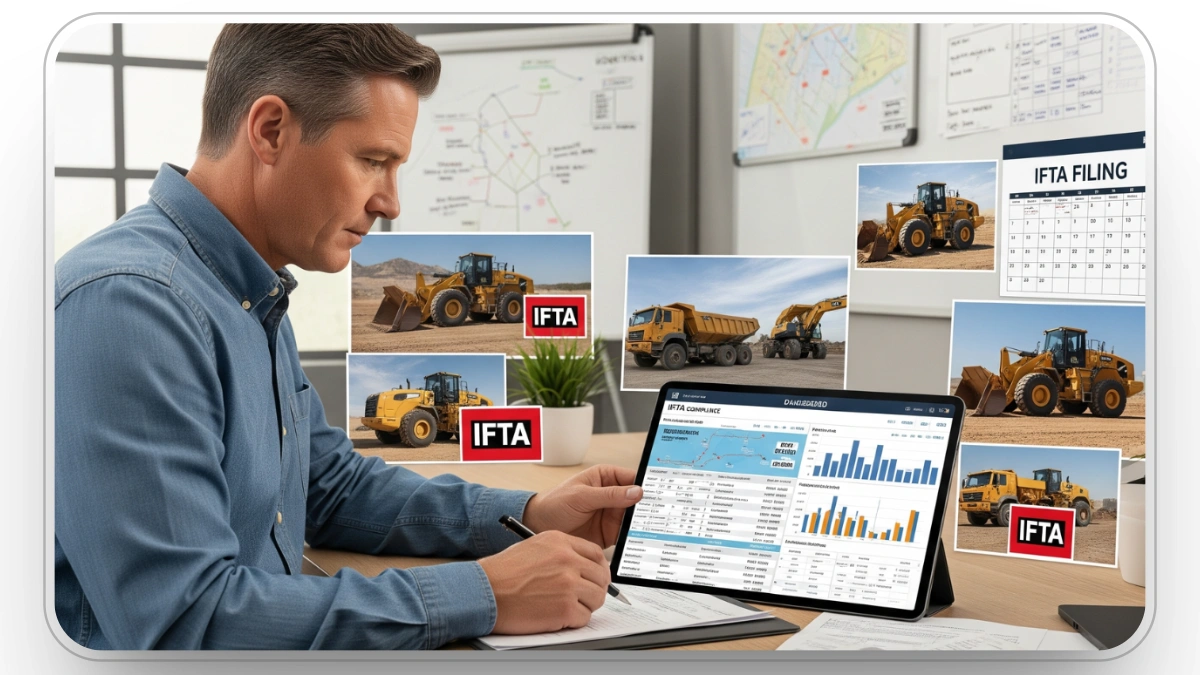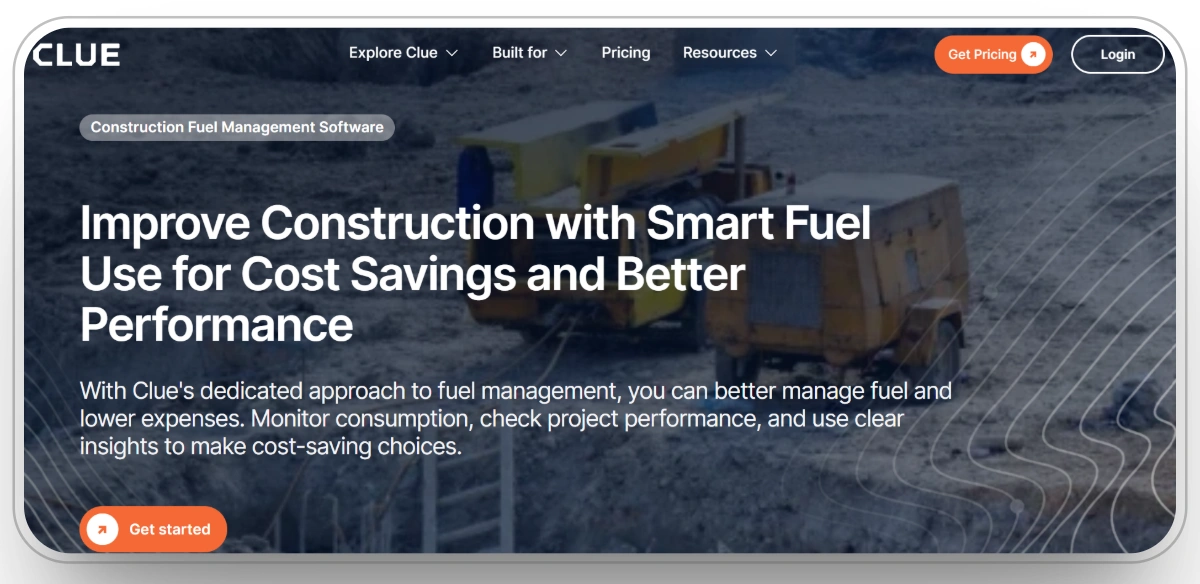Comprehensive Guide to IFTA Compliance in 2025
International Fuel Tax Agreement (IFTA) is a crucial component of the trucking and transportation sector, having been formed in the year 1993.
IFTA's aim at simplifying fuel tax reporting among motor carriers across jurisdictions, the IFTA's also ensure payment of fair amount of fuel tax between States of the U.S and between provinces in Canada.
Among the motor carrier industry, this implies reduced red tapes and smoother operations. Nevertheless, maintaining compliance with the IFTA rules is still a tricky affair, since it deals with several jurisdictions and a number of variables.
This guide is tailored specifically for construction fleet and equipment operations teams—including:
- Fleet Manager managing dozens or hundreds of mobile assets across multiple sites.
- Equipment Managers responsible for filing quarterly tax returns and maintaining regulatory records.
- Project Managers overseeing equipment transport between jurisdictions.
Whether you manage lowboys, pavers, material haulers, or asset transfer teams, this guide will help you stay compliant with IFTA while minimizing operational friction and maximizing cost control.
What is IFTA?

The International Fuel Tax Agreement (IFTA) is a compiling agreement between the U.S. states (except Alaska and Hawaii) and Canadian provinces. It makes administration of interstate travel fuel taxes easier to commercial motor carriers.
Prior to IFTA, the system was cumbersome because different carriers were required to file individual fuel tax returns in each state or province that they were doing business in; this system was complex. This issue is resolved by IFTA where carriers are permitted to submit a single quarterly fuel tax return encompassing all jurisdictions traveled by the carrier.
Historical Context of IFTA
Before IFTA, motor carriers that hauled across state and provincial lines were required to record their usage of fuel in each state or province and remit fuel taxes in individual fuel tax returns to individual states and provinces as they transverse the state and provincial jurisdictions.
This was not only inefficient and prone to errors thus resulting in the over payments or underpayments of taxes, both resulting in potential logistical headaches to trucking companies.
This system was simplified in 1993 when the International Fuel Tax Agreement was unveiled. In the beginning, the 48 U.S. states and 10 Canadian provinces adopted it.
The main objective of IFTA was to make sure that there was fair and transparent distribution of fuel taxes throughout the various jurisdictions, all without subjecting the carriers to the burdens of cross-state or interstate fuel tax returns.
How IFTA Works

The international fuel tax agreement or IFTA is a streamline fuel tax reporting program that is facilitated to assist motor carriers with operations in more than one state in the United States of America and the provinces in Canada. Here is how it is to be done:
- Registration: Carriers apply to IFTA in their base jurisdiction (the jurisdiction in which their business is located) and are provided an IFTA license and decals to the qualified vehicles.
- Tracking Fuel & Miles: During every quarter, the carriers monitor:
- Jurisdiction purchasing of fuel information (type, amount and cost).
- Drivers in various jurisdictions managed to drive miles, either by GPS or ELDs.
- Quarterly Filing: A single quarterly fuel tax return is filed by the carriers then fuel consumption and travelled miles of all jurisdiction travelled in the quarter are combined.
- Tax Calculation: The carrier takes the rate of fuel tax charged by the jurisdiction under consideration and calculates taxes charged on fuel consumed and miles traveled in the jurisdiction.
- Tax Payment/Refund: Tax-payer remits the tax to the base jurisdiction which apportions the right amount to each co-state or co-province. Refunds take place due to over payments.
Who Needs to Comply with IFTA?
The motor carrier who operates under two or more jurisdictions and who apply vehicles that fit certain criteria has to comply with IFTA:
- Two axled vehicles whose gross vehicle weight (GVW) is higher than 26,000 pounds (11,797 kg).
- Vehicles that have three axles, irrespective of their weight.
- Vehicles under combination vehicle type with a combined weight of over 26,000 pounds (11,797 kg).
In addition to weight requirements, vehicles must be used in interstate commerce, meaning that they travel through more than one jurisdiction. Intrastate vehicles, those operating solely within a single state or province, do not need to register for IFTA.
Exemptions
Besides the weight requirements, the vehicles should be engaged in interstate commerce, i.e., move across two or more jurisdictions. Vehicles that work in one state or province (Intrastate vehicles) are not required to become registered under IFTA.
IFTA Compliance for Construction Equipment

Although heavy construction equipment, which includes bulldozers and cranes, is not directly affected by IFTA (International Fuel Tax Agreement), vehicles operated at the road that transport such construction equipment to another state or province are affected.
Transport trucks, such as dump trucks, material haulers and construction equipment transporters that transport new pieces of equipment between work sites, should adhere to IFTA as long as they operate in 2 or more jurisdictions.
IFTA requires these vehicles to track:
- Fuel purchases across jurisdictions.
- Miles driven in each state or province.
Construction companies must ensure accurate fuel tax reporting for these vehicles, even though the equipment itself is exempt.
Understanding IFTA License and Decals
Once a carrier is required to register for IFTA, they receive:
- An IFTA License: This license should be present in the vehicle when operating in more than one jurisdiction. It should be reinstated on a yearly basis.
- Two IFTA Decals per Vehicle: The decals must be displayed on the driver side of every vehicle and must be such that the enforcement officer can ascertain the IFTA compliance with ease.
These decals can be issued or renewed annually with a 2-month grace period during the early part of the new year to enable carriers that have already applied through renewal to use old decals.
Quarterly Fuel Tax Reporting Key Deadlines for 2025
The motor carriers must submit the quarterly fuel tax return though no fuel has been bought during the quarter or there is no travel. This is termed as zero return.
These are the filing dates of the year 2025:
- Q1 (January 1 - March 31): Due by April 30, 2025.
- Q2 (April 1 - June 30): Due by July 31, 2025.
- Q3 (July 1 - September 30): Due by October 31, 2025.
- Q4 (October 1 - December 31): Due by January 31, 2026.
A late fill fee is a flat payment and an interest charge both depend on local jurisdiction. As an example, the late filing penalties may be as low as $50, and as high as 100 dollars per month, or even more, depending on the laws of the jurisdiction.
How Taxes Are Calculated Under IFTA
The calculation of IFTA taxes involves several key steps:
- Total Fuel Consumption: The carrier keeps the record of the total amount of gallons of fuel bought in a jurisdiction.
- Miles Traveled: The quantity of miles used in every jurisdiction is placed and accounted for.
- Fuel Tax Rates: The rate of fuel tax varies in each jurisdiction with the rate charged on the gallons of the fuel consumed in that jurisdiction. Tax rates of fuel could be different, based on gasoline or diesel or any other type of fuel.
As an illustration, California charges a high rate of taxation on diesel fuel unlike many other states such as Texas or Florida which tend to be low. It implies that when a carrier is traversing in California he or she will pay higher taxes on the fuel he or she burns in California more than the states with low income tax rates.
As a construction operations leader, your vehicles may not look like typical over-the-road freight trucks—but if they cross jurisdictional lines, you are still required to:
- Register for IFTA
- File accurate quarterly fuel and mileage reports
- Maintain audit-ready documentation for every asset that moves across state or provincial boundaries
This guide is written specifically for your context—where hauling a scraper to a job site 20 miles across state lines triggers reporting responsibilities.
Record Keeping Requirements for IFTA Compliance
One of the most important aspects of IFTA compliance is maintaining accurate and thorough records. These records must be kept for at least four years and be readily available for audit. The following records are required:
IFTA Penalties for Non-Compliance
Failure to comply with the IFTA regulations is faced by sharp penalties which vary depending on the jurisdiction in question.
Technological Tools for IFTA Compliance
Technology is of great importance in assisting carriers to make IFTA reporting easier, given the complexities of compliance. The following are some of the tools that can be used to help:
- IFTA Reporting Software: Applications such as Geotab make reporting of fuel taxes automatic and therefore much easier to meet the IFTA requirement by motor carriers. These computer applications monitor the consumption of fuel, mileage travel, and prepare IFTA reports.
- GPS and Telematics: Telematics and the latest version of the GPS could be utilized to keep the monitoring of vehicles movements, along with fuel levels, real-time. This gives the carriers precise information on the mileage and fuel consumption, hence less chances of inaccurate declaration of the returns of IFTA.
- Electronic Logging Devices (ELDs): They not only monitor the number of driving hours but also help to keep a check on the mileage, thus a report that is accurate can be prepared to file the IFTA returns.
How to Apply for an IFTA License and Decals
The process of applying to receive an IFTA license is simple, yet essential to make no errors when filling out your application, as a single error could cost you time waiting to be approved and your legality in operating within other jurisdictions.
- Determine Eligibility: Make sure that your vehicles can qualify under IFTA (used in interstate/international trade, their weight exceeds 26,000 lbs. or has a minimum of three axles).
- Identify Your Base Jurisdiction: It is where you register your vehicles and keep operational records. Any applications take place through the motor carrier or the tax authority in the base jurisdiction.
- Complete the IFTA Application: List of name, address, USDOT or motor carrier number, and description of vehicles qualified to have business. Majority of jurisdictions perform online submission.
- Pay Applicable Fees: The cost of license and decals differs depending on the jurisdiction. The states/provinces also impose extra processing charges.
- Receive Your License and Decals: One license to cover one power unit (to be found in the vehicle or the main office depending on the demands) and 2 decals will be provided.
- Affix Decals: These power units should have place decals on both sides.
- Renew Annually: License fees and decals are annual fees valid within a calendar year so renew by the time it is expired or face penalties.
How Clue Facilitates IFTA Compliance Reporting

Clue is a cloud-based equipment management and maintenance software tailored for the construction industry. While its primary focus is on equipment maintenance and project management, Clue offers features that can assist in International Fuel Tax Agreement (IFTA) compliance reporting.
Here's how:
1. Automated Data Collection
Clue is integrated with GPS and the Electronic Logging Devices (ELDs) that will automatically record the mileage and the amount of fuel used. This automation will help minimize entry data errors that occur when it is done manually and guarantee proper reporting on IFTA filings.
2. Centralized Record Keeping
The software integrates the fuel purchase receipts, the maintenance records and mileage log in a central location. This organization makes it easy to collect the documentation required to make IFTA reports.
3. Real-Time Monitoring
Clue enables managers to track the use of fuel and mileage in various jurisdictions in real time. The feature contributes to the compliance with the IFTA requirements.
4. Maintenance and Compliance Alerts
The platform also provides automated maintenance program reminders and guarantees compliance with regulators, as maintenance programs can also be subjected to numerous warnings, fines, and other penalties.
5. Integration with Fuel Cards
Clue has a seamless integration with fuel card providers which makes it easier to track the fuel purchases and the transactions are also correctly documented to report to IFTA.
Palmetto Corp & Clue
Darrin Sheriff, Director of Maintenance and Purchasing at Palmetto Corp, faced an overwhelming challenge: managing over 800 pieces of construction equipment across numerous job sites, driving 60,000+ miles annually just to stay on top of it all.
“Before Clue, critical information and equipment statuses were scattered across various platforms… real-time monitoring was practically impossible.”
After implementing Clue, Darrin consolidated all asset data into a single pane of glass, streamlining IFTA-relevant metrics like location-based mileage, fuel activity, and maintenance status. His team saved $1M+ in the first year, improved service capacity from two to six units per day, and avoided a $20,000 engine replacement by catching an oil leak early.
“To not have Clue, I would probably have to hire 30–40 people just to track and report manually. That's huge.”
Best Practices for IFTA Compliance

To help carriers stay compliant with IFTA in 2025, here are some best practices:
- Automate the Reporting Process: Record in detail and with the help of special software, which is IFTA -specific automatized, fuel taxes, mileage tracking, and reports. Automation eliminates human mistakes and on-time filings.
- Conduct Internal Audits: Check your records and fuel tax filings on a regular basis to see what problem areas are present and address them before they turn into big problems. Any discrepancy can be avoided by notifying it early to avoid costly penalties.
- File on Time: Do not forget to file. Put reminders in quarterly returns in order to file on time and prevent late fees.
Conclusion
Compliance with IFTA is one of the essential matters of the trucking and transportation sector, and it guarantees that fuel taxes are calculated and dispersed equitably within states. Although it might appear complicated, it can always be simplified by using modern technologies, keeping detailed records, and respecting best practices.
In 2025, when motor carriers have to operate in various jurisdictions, the awareness of IFTA requirements is essential, and the utilization of digital-based solutions can prevent any penalties.
Transform Your Equipment Management












